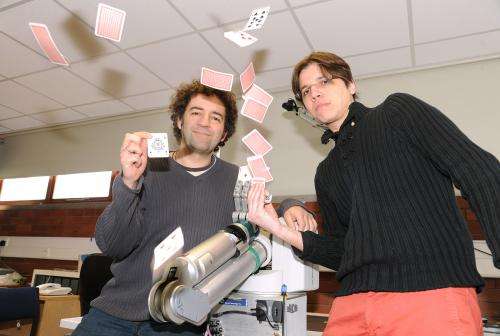Neuro-magic: Magician uses magic tricks to study the brain's powers of perception and memory

A magician is using his knowledge of magic theory and practice to investigate the brain's powers of observation.
Hugo Caffaratti, engineer and semi-professional magician from Barcelona, Spain, has embarked on a PhD with the University of Leicester's Centre for Systems Neuroscience.
Hugo has 12 years of experience working with magic – specialising in card tricks – and is a member of the Spanish Society of Illusionism (SEI-ACAI).
The engineer also has a longstanding interest in neuroscience and bioengineering, having taken a Master's degree in Biomedical Engineering at University of Barcelona.
He hopes to combine his two interests in his PhD thesis project, which covers a new field of Cognitive Neuroscience: Neuro-Magic.
As part of his work, he will investigate how our brains perceive what actually happens before our eyes – and how our attention can be drawn away from important details.
He also plans to study "forced choice" - a tool often used by magicians where we are fooled into thinking we have made a free choice.
Among other experiments, Hugo will ask participants to watch videos of card trick performances, while sitting in front of an eye-tracker device.
This will allow him to monitor where our attention is focused during illusions – and how our brain can be deceived when our eyes miss the whole picture.
Hugo said: "I have always been interested in the study of the brain. It is amazing to be involved in the process of combining the disciplines of neuroscience and magic.
"I am really interested in the fields of decision making and forced-choice. It is incredible that many times a day we make a decision and feel free. We do not realise that we have been forced to make that decision.
"I am constructing an experiment to study what happens when we make forced decisions – to try and find the reasons for it. I am thinking about which kinds of tricks I know could be useful to give more insights about brain function."
He will work under the tutelage of Professor Rodrigo Quian Quiroga, director of the Centre for Systems Neuroscience.
Professor Quian Quiroga's recent work on memory formation was the topic of his recent book "Borges and memory" (MIT Press) and was also featured on the front page of the international science publication Scientific American.
Professor Rodrigo Quian Quiroga said: "I am very interested in connections between science and the arts. Last year, for example, we organized an art and science exhibition as a result of a 1-year rotation in my lab of visual artist Mariano Molina. Hugo's PhD will look at decision-making and attention – and although he is doing his first steps in neuroscience, I think he already has a lot of expertise in this area based on his training as a magician.
"Magic theory has thousands of years of experience. Magicians have been answering similar questions that we have in the lab, and they have an intuitive knowledge of how the mind works. Hugo will likely bring a fresh new view on how to address questions we deal with in neuroscience."
Hugo is also keen to carry on with his work in magic while studying for his PhD, and is hoping to perform in bars in Leicester while staying here.
He has also applied for membership with The Magic Circle – a prestigious magic society of London. He will have to sit exams to prove his magical mettle in order to join the exclusive club.













